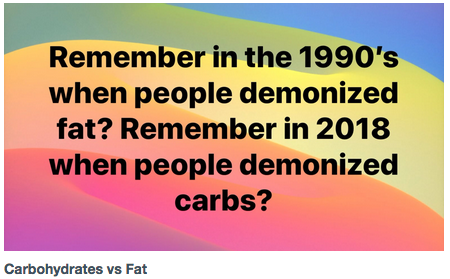Carbohydrates vs Fat. Each have been demonized by diets over the last few decades. It’s a hot debate right now in the nutrition and weight loss world. Who is right, who is wrong? How can they co-exist?
Is a low carb diet the way to go or can carbs be part of a meal plan to lose weight? Find out in this video..
[video_player type=”embed” style=”1″ dimensions=”560×315″ width=”560″ height=”315″ align=”center” margin_top=”0″ margin_bottom=”20″ ipad_color=”black”]![]() [/video_player]
[/video_player]
Carbohydrates and fat are different macronutrients of calories we consume from food.
Carbs increase insulin in our bodies, which can be looked at as a storage hormone, in terms of fat loss. Because carbs increase insulin levels this is bad in terms of fat loss, but good in terms of building muscle.
Carbohydrates impact insulin. Protein impacts insulin only a little because it also increases glucagon, which directly opposes insulin. Fat by itself does not impact insulin at all, but carbohydrates and fat together, does a double whammy increase on insulin.
How much our insulin is elevated and for how long it stays elevated depends on what and how much we are eating. So if we eat something that is super high in sugar, but we don’t eat a ton of it like a couple of dates or a handful of jelly beans, we may get a rapid short spike. Or, we could possibly eat a big bowl of oatmeal and a banana, which doesn’t have a lot of fast spiking sugar, but overall, it does have a lot of carbs, so this could elevate our insulin for a while. The previous is what we consider to be the glycemic index – how much a food will spike our insulin levels, and the latter is what we consider to be the glycemic load – how long our insulin levels will stay elevated.
Neither are inherently bad as they are part of our body’s natural functionality, but we do not want our body to have chronically elevated insulin levels, as that can decrease sensitivity to insulin and long term, that can lead to diabetes.
However, when it comes to building muscle, carbohydrates are your friend. After you workout especially, getting a fast digesting protein (like whey isolate protein powder) and fast digesting glucose based carbohydrate like white rice, white rice food products, potato or potato food products or white flour or flour based food products,can help you build muscle. As stated previously, insulin helps build or store, and in this case, this will help you. So if you are under, say 20- 25% body fat, and you are trying to get lean AKA build muscle, or if you are a performance athlete (think training for a race or weightlifter or CrossFit athlete), this is important for you!!! Perhaps carb cycling or carb timing can be great if this fits your description.
Now, some humans do really well with carbohydrates and run on them very efficiently, and actually need more of them to stay energized and focused. But on the other hand, some humans run more efficiently on lower carbohydrates and more fat. The only way to know this is through experimentation.
Fat is great for us too, but again, a high fat diet works better for some whereas a high carb diet works better for others. Fat digests slowly and can keep us feeling satisfied and satiated and it’s also great brain fuel.
For someone who is less sensitive to insulin due to chronic elevation or other reasons, can do really well on a low carb diet, being 75g of carbs or less. A low carb diet can increase their sensitivity to insulin again and help them lose fat. A low carb diet can also be helpful for someone with PCOS, menopause or any other hormonal imbalance; someone with a more sedentary lifestyle; or those with a lot of fat to lose.
Another way to determine how a particular meal is going to affect your insulin levels is through this formula:
Take the total number of carbs in your meal, so for example, if you are having steak, mashed sweet potato with coconut milk and sauteed spinach and mushrooms in olive oil, and a piece of dark chocolate, you add up ALL of the carbs in the entire meal. So let’s say there’s 30g of carbohydrates. Then you would subtract the number of protein grams (let’s call it 20g) and you would subtract the number of fiber grams (let’s say there’s 8g of fiber) so that’s 30 – 20 – 8 = 2g left. Anything under 10g is going to have minimal impact on your insulin.
Ultimately we do want balance, but there’s a reason for carbs to be good or bad and there’s a reason for fat to be good or bad. It just depends on YOU, your body and your goals.
Do you need help figuring out the right clean eating meal plan for you?
Go to Commit2FitCoaching.com/freeassessment and let me help you.
Your Coach,
Kyra
P.S. Everyone is different. Some people do better with more carbs and some do better with more fat. It’s all individualized which is why I run #Commit2Fit with personalized meal plans. Everything should be custom and designed specifically for YOU.
